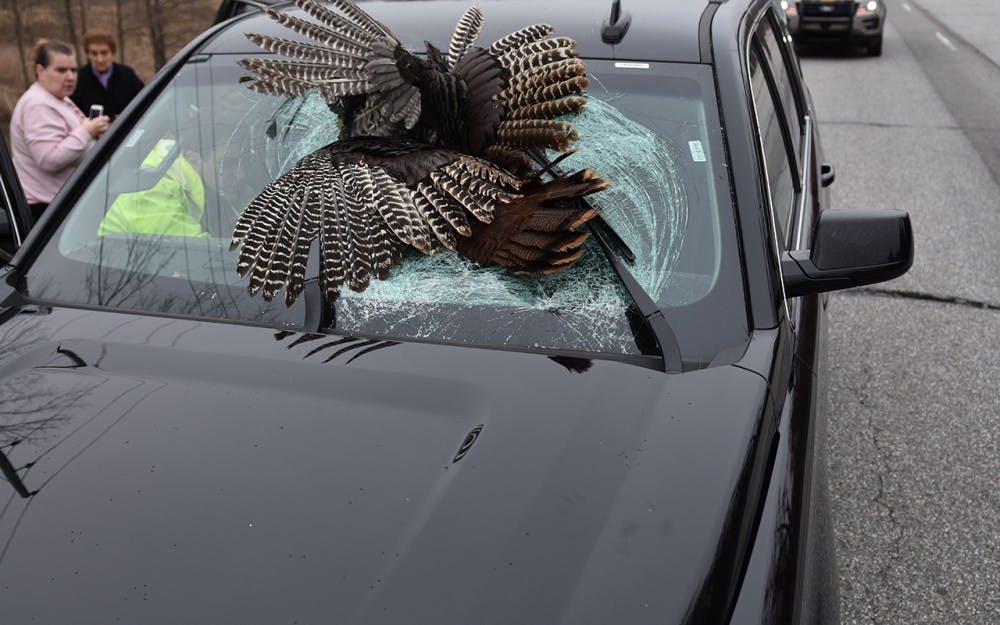John Tarabocchia was trying to meet his daughter at the airport in Chicago on March 28. He was going to fly home to New Jersey, but a 35-pound turkey nearly derailed his plans.
Tarabocchia was driving from South Bend, Indiana, through LaPorte County, Indiana, with his wife, son and mother-in-law in a rental car when he saw four turkeys near the edge of the road. Three of them ran away, he said, but the fourth went airborne.
Then the bird crashed through the black GMC Yukon’s windshield.

“I’m just thankful nobody got hurt,” Tarabocchia said. “Well, except for the bird, I guess.”
As the weather warms up, wild turkeys split up from their winter flocks and start their mating season, Indiana wildlife biologist and wild turkey expert Steve Backs said. When they start looking far and wide for a mate, they run into roads more often than usual.
Turkeys can’t fly as well as many other birds, Backs said. They walk and run most of the time, and they can only stay in the air for a few hundred yards. So flying over a busy highway is a daunting task.
“They try, god bless them, but they just can’t get much air,” said Michael Kellems, the captain from the LaPorte County Sheriff’s Office who responded to the first accident. “Usually they’re skittish and stay far from the roads, but during mating season turkeys are a lot like college students in Florida on spring break. The turkey probably just had something else on his mind.”
Finding a turkey hen to mate with is what’s on a turkey’s mind this time of year. When wild turkeys are in breeding season, they show off for potential mates by “strutting”: spreading their tail feathers into a fan, walking back and forth with small steps, and making spitting or drumming sounds. The goal is to appear more dominant than the other male turkeys nearby, Bob Eriksen from the National Wild Turkey Federation said.
The three turkeys who met their ends on Indiana roads last month will never get the chance to strut again. When the turkey struck Tarabocchia’s windshield, he pulled over to the side of the road while his family screamed. Shattered glass flew into the car, and the still-living turkey bobbed around, lodged into the windshield and trying to escape.
Tarabocchia and his family made it to O’Hare International Airport in time to meet his daughter, he said. The five of them flew home, but the turkey soon died.
When state trooper Tia Deaton hit a turkey near Scottsburg while on her way home for the day, she said she carried the turkey’s body away and threw it away herself. She didn’t want any other cars to hit the turkey or anyone to see it lying mangled on the side of the road.
“I thought at first it would make it over my car, but it just kept flying lower and lower, and then it was right there in the middle of my windshield,” Deaton said. “I just kept thinking, ‘Oh my, that’s a big bird.’”
Two days after Deaton watched the turkey fall from the air onto her car, state trooper Aaron Weller’s windshield abruptly ended the life of the third turkey of the week. His collision was the second in LaPorte County.
When Kellems saw the shattered windshield of Tarabocchia’s rental car, he said he had never seen a turkey cause so much damage to a car. Before this spring, he had only ever heard of about one turkey-car encounter each year.
While it’s unusual to see so many incidents in a short period of time, Backs said it’s most likely just a coincidence. Wild turkeys move around a lot more when they leave their flocks to look for an intimate companion for the spring, so it’s more surprising to Backs that there aren’t more road accidents.
“In the ones we do see, most are not as sensational as going through the windshield,” Backs said. “It would usually cause a lot less damage.”
Nobody quite knows what else to make of the string of such similar collisions.
“I suppose they do say things come in threes,” Tarabocchia said. “It’s kind of funny how many times it happened after the fact.”
No human was seriously hurt in any of the three accidents, but none of the turkeys lived to find what they were crossing the street to look for: a feathered female friend.






